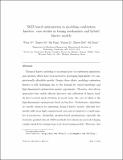| dc.contributor.author | Ji, Weiqi | |
| dc.contributor.author | Su, Xingyu | |
| dc.contributor.author | Pang, Bin | |
| dc.contributor.author | Li, Yujuan | |
| dc.contributor.author | Ren, Zhuyin | |
| dc.contributor.author | Deng, Sili | |
| dc.date.accessioned | 2024-08-16T18:34:18Z | |
| dc.date.available | 2024-08-16T18:34:18Z | |
| dc.date.issued | 2022-09 | |
| dc.identifier.uri | https://hdl.handle.net/1721.1/156214 | |
| dc.description.abstract | Chemical kinetic modeling is an integral part of combustion simulation, and extensive efforts have been devoted to developing high-fidelity yet computationally affordable models. Despite these efforts, modeling combustion kinetics is still challenging due to the demand for expert knowledge and high dimensional optimization against experiments. Therefore, data-driven approaches that enable efficient discovery and calibration of kinetic models have received much attention in recent years, the core of which is the high-dimensional optimization based on big data. Evolutionary algorithms are usually adopted for optimizing chemical kinetic models, although they usually suffer from high computational costs and are limited to a small number of parameters. Meanwhile, gradient-based optimizations, especially the stochastic gradient descent (SGD) methods, have shown success in developing complex models by training large-scale deep learning models. Therefore, this work explores the applications of SGD-based optimizations in tuning mechanistic kinetic models and learning hybrid kinetic models. We first showed that SGD-based optimizations could substantially save computational cost compared to evolutionary algorithms when the number of kinetic parameters in mechanistic models reached about one hundred. We then demonstrated that the SGD-based optimization enabled us to use a neural network model to represent the pyrolysis of the Hybrid Chemistry and optimize the associated hundreds of weights in the neural network. These proof-of-concept studies showed that the SGD-based optimization is more efficient than evolutionary algorithms, is a promising approach for developing chemical kinetic models with high dimensional parameters, and is capable of developing hybrid mechanistic-machine learning kinetic models. | en_US |
| dc.language.iso | en | |
| dc.publisher | Elsevier BV | en_US |
| dc.relation.isversionof | 10.1016/j.fuel.2022.124560 | en_US |
| dc.rights | Creative Commons Attribution-Noncommercial-ShareAlike | en_US |
| dc.rights.uri | http://creativecommons.org/licenses/by-nc-sa/4.0/ | en_US |
| dc.source | Author | en_US |
| dc.title | SGD-based optimization in modeling combustion kinetics: Case studies in tuning mechanistic and hybrid kinetic models | en_US |
| dc.type | Article | en_US |
| dc.identifier.citation | Ji, Weiqi, Su, Xingyu, Pang, Bin, Li, Yujuan, Ren, Zhuyin et al. 2022. "SGD-based optimization in modeling combustion kinetics: Case studies in tuning mechanistic and hybrid kinetic models." Fuel, 324. | |
| dc.contributor.department | Massachusetts Institute of Technology. Department of Mechanical Engineering | |
| dc.relation.journal | Fuel | en_US |
| dc.eprint.version | Author's final manuscript | en_US |
| dc.type.uri | http://purl.org/eprint/type/JournalArticle | en_US |
| eprint.status | http://purl.org/eprint/status/PeerReviewed | en_US |
| dc.date.updated | 2024-08-16T18:28:13Z | |
| dspace.orderedauthors | Ji, W; Su, X; Pang, B; Li, Y; Ren, Z; Deng, S | en_US |
| dspace.date.submission | 2024-08-16T18:28:15Z | |
| mit.journal.volume | 324 | en_US |
| mit.license | OPEN_ACCESS_POLICY | |
| mit.metadata.status | Authority Work and Publication Information Needed | en_US |
